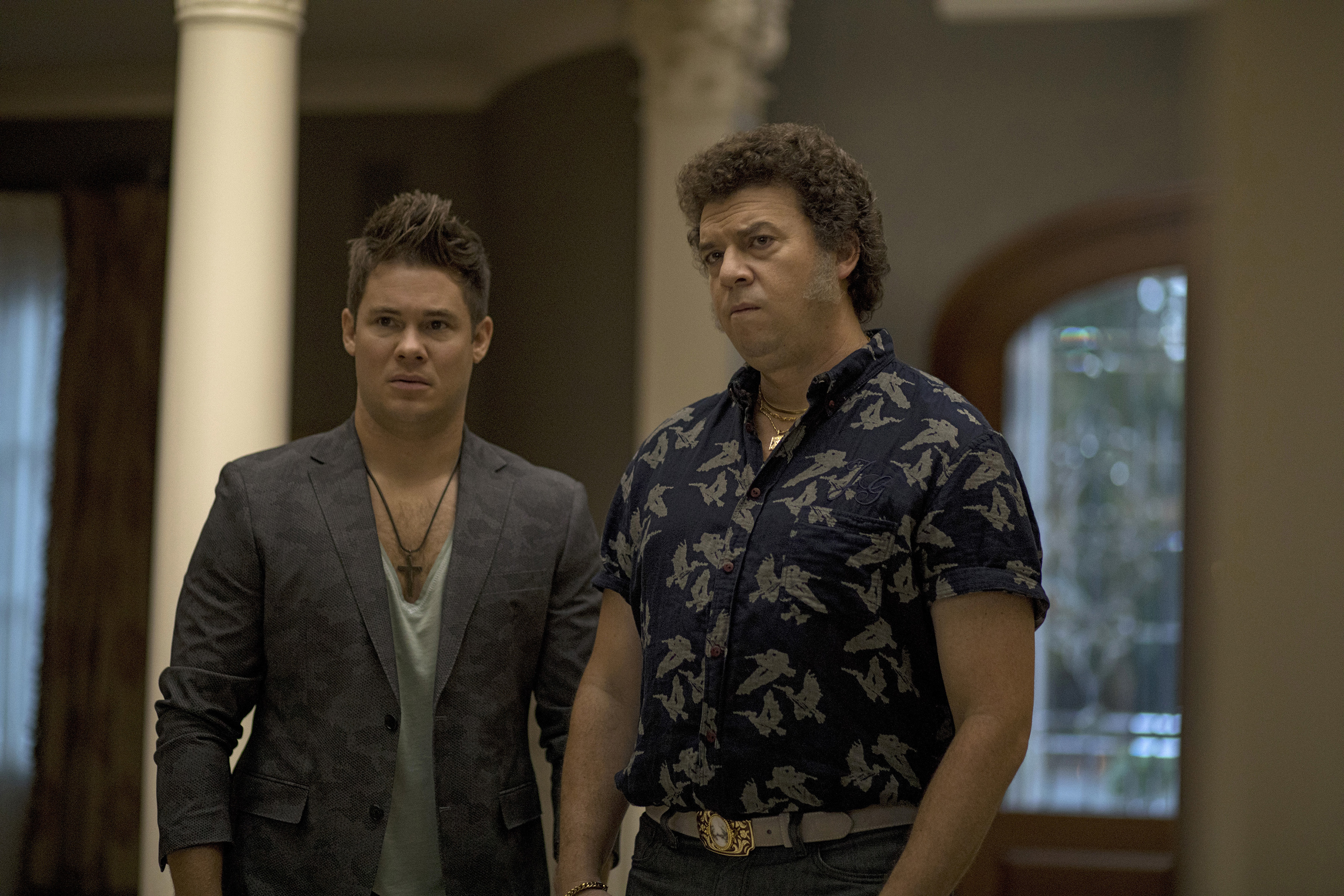The first scene in HBO’s new dark comedy The Righteous Gemstones is also the show’s funniest. The show’s titular Gemstones, an uber-successful family of televangelists led by Eli (John Goodman), his eldest son, Jesse (Danny McBride), and youngest son Kelvin (Adam Devine), are on a mission trip in Chengdu, China, and they’re 17 hours into hosting an all-day baptism marathon. They’re visibly pissed off and phoning it in. McBride and Devine really sell the physical comedy, splashing each other and bickering between haphazardly dunking people into a wave pool. Then, the pool’s waves inexplicably turn on, causing a near-tsunami that throws the event into chaos. It’s an absurd, laugh-out-loud scene that’s made weirder by the fact that just last week, in China, a wave pool horrifyingly malfunctioned, resulting in 44 injuries. The Righteous Gemstones is at its best when it’s just outlandish enough to be plausible.
From its cold open to the way show painstakingly builds the ridiculous, ultra-capitalist world of the Gemstones, the show’s attention to detail is one of its strongest assets. Show creator Danny McBride reunites with his Vice Principals and Eastbound & Down collaborators David Gordon Green and Jody Hill to complete a de facto trilogy of shameless people doing shameless things. Only in front of the cameras and congregations are the Gemstones paragons of virtuous living. They curse, cheat, steal, do drugs, sleep with prostitutes (at least is the case with McBride’s Jesse), purposefully drive out smaller parishes in favor of their own big-box protestant megachurches, and will do whatever it takes to maintain their wealth and power. The hour-long pilot, the best episode in the six episodes HBO provided to the press, is a master class in world-building.
Videos by VICE

photo: Fred Norris/HBO
McBride and his fellow showrunners have gone to great lengths to say that the show is not an attack on evangelical Christianity as a whole. He said to EW, “The goal of it is not to be a takedown of anything. It’s setting a story in a world that I haven’t seen.” He later elaborated to the New York Post, “I have no qualms with religion. For me, this is more a story about hypocrisy.” The detail with which they lampoon their protagonists, pointing out the family’s blatant hypocrisies with brutal precision, is almost overwhelming.
The Gemstones’ four-house compound, which also houses the family’s undervalued, people-pleasing, and rebellious middle child, Judy (the excellent Edi Patterson), is a stunning tour of opulence. The decorative mix of gaudiness and Christian iconography is also an unsparing juxtaposition. A later episode reveals a shooting range and obstacle course somewhere on the property. It’s easy to draw comparisons to real-life televangelists like the late Jerry Falwell, Joel Osteen, and “cool pastor” Carl Lentz. Though the Gemstones might be a more rough-around-the-edges amalgamation, their slick charisma and excessive profiteering are easily recognizable.

photo: Fred Norris/HBO
The show’s creators are clearly well-versed in the ins and outs of evangelical quirks. Anyone who’s ever been in a megachurch will easily recognize the stereotypes. Devine’s portrayal of Kelvin is a pitch-perfect encapsulation of the youth pastor archetype: childlike exuberance, goofy faux-hip fashion sense, a la Justin Bieber-affiliated megachurch Hillsong, and a propensity to use words like “bullcrud.” His older brother Jesse is a much cruder caricature. Brash, mutton-chopped, and regressively conservative, McBride’s performance is unsympathetic.
The most welcome reprieve to Jesse’s intentionally grating persona is his horrible and hilarious son Pontius, who spends his time underlining bad words in the Bible and hurling expletives at his own father. Jesse’s wife, Amber (Cassidy Freeman) is eerily comfortable in her status as a wealthy “bless your heart” housewife who consistently gives her husband a pass for bad behavior and also weaponizes her own piety against other women. The closest thing resembling a humane character is Goodman’s Eli, who, aside from being awful to other pastors and his own children, does have a resonant and empathetic arc as he grieves his dead wife. Not really featured are the Gemstones’ actual parishioners. Even when the show highlights a church service, they’re treated mostly like agreeable sheep.

photo: Fred Norris/HBO
While The Righteous Gemstones is funny, the disdain it holds for its own protagonists is jarring. As with McBride’s previous HBO comedies, he excels at portraying unrepentantly awful people unrepentantly doing awful things until they learn to be somewhat repentant about doing those awful things. Here, there is such a barrage of depravity and phoniness that it’s kind of a drag to take in. Maybe it’s because the Gemstones, unlike the Eastbound & Down hero and washed up pitcher Kenny Powers, are successful and at the top of their game. It’s easier to empathize with an underdog. The family’s inherent callousness, like to Judy and her effete and liberal fiancé B.J. (Tim Baltz), can conjure up laughs, but sometimes it just gets so dark that it loses its comedy. An episode later in the season that relies heavily on flashbacks manages to humanize these characters slightly, but it requires hours of sometimes-grueling watching to get there.
The Righteous Gemstones prides itself on shining a light on the inherent darkness in people who don’t practice what they preach. While later episodes may dive into their actual parishioners—the perhaps decent people who follow the Gemstones’ teachings—the show places so much focus is on the family’s faults that it loses its humanity. Perhaps its characters will grow to be a little less terrible by the end of the season. If they do, that journey might be more interesting than pointing out that false virtue from religious leaders is bad.




